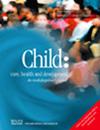Navigating Child Oral Health in Western Australia: A Caregiver's Perspective
Abstract
Background
Early childhood caries (ECC) is the most common chronic health condition among Australian preschool-aged children. Untreated, ECC can affect children's physical and emotional health and future social opportunities. ECC is largely preventable through primary caregivers' correct understanding of oral health promoting diets, oral hygiene practices and dental service engagement. The study aim is to explore Western Australian (WA) primary caregivers' child oral health knowledge, experience and practices. The Fisher-Owens socioecological model of child oral health was applied across the study to structure and interpret the findings across the complex, interactive sociocultural influences on child oral health.
Methods
The mixed-methods convergent research design included a questionnaire and focus group sessions with a purposive sample of primary caregivers of children aged under 5 years across two geographical WA locations (metropolitan and regional areas). Questions sought to understand participant knowledge, practices and experiences across categories of tooth safe diet and feeding practices, oral hygiene and oral health services. Questionnaire data underwent simple descriptive statistical analysis. Focus group data were organised using Nvivo v12 software and analysed using the codebook approach to thematic analysis, in which the coding process is guided by Braun and Clarke's predetermined coding frame. The study explored the social determinants of participants' geographical location, English language status and educational attainment.
Findings
Participants (n = 42) completed the questionnaires and attended one of 10 focus groups. Findings reveal that despite the availability of evidence-based oral health guidelines for health professionals, participants reported they received inconsistent messages on the topic. Widespread confusion is evident from all social backgrounds about child oral health and hygiene, in particular, fluoride use, brushing regimes and dietary sugars. Dental service engagement is suboptimal, influenced by lack of availability, cost and perception of a lack of child-friendly dental services. Cost is a particular factor influencing lower dental service engagement among English as an additional language primary caregivers, whereas lack of availability affects those in regional areas.
Recommendations
Individual, community and wider structural recommendations are offered to promote equitable, accessible and consistent child oral health promotion and dental services.

 求助内容:
求助内容: 应助结果提醒方式:
应助结果提醒方式:


